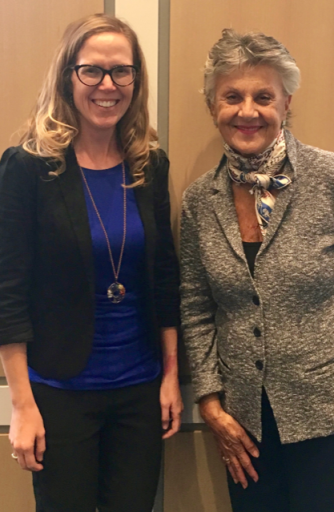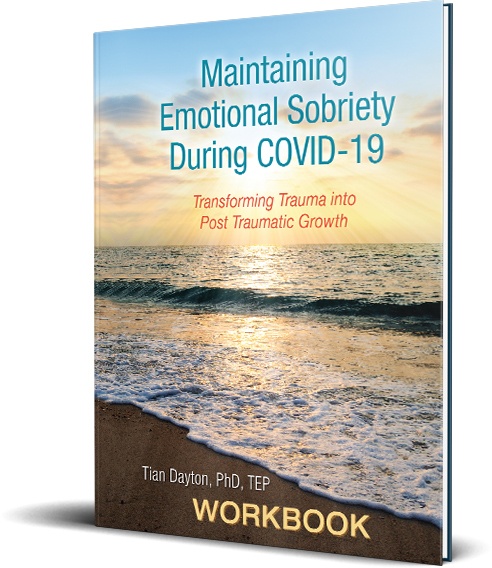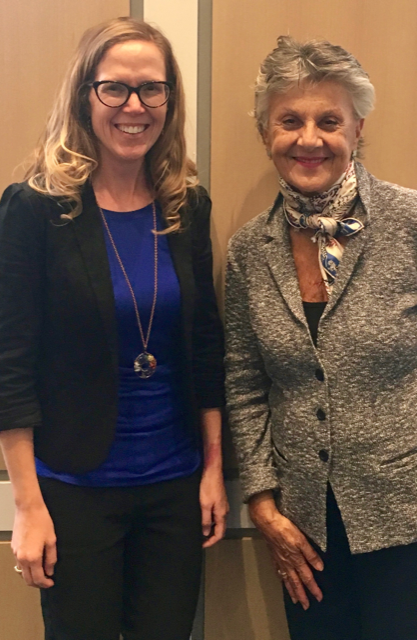
During this unprecedented worldwide pandemic, I have been struggling to finish writing a book about my own PTSD—as more trauma piles into all of our lives. Meanwhile, my colleague Dr. Tian Dayton began and finished writing an entire book with tools to navigate the COVID-19 crisis by the end of May! I learned about her new workbook Maintaining Your Emotional Sobriety During COVID-19 in an email she sent out on May 25, which just so happens to be my birthday. Indeed, Dr. Dayton’s work and her new book are precious gifts in my life. Her work is a constant reminder for me to slow down, listen to my body, and practice self-care. These nuggets of wisdom would be crucial messages for me in July when I contracted COVID-19 myself.
I will share more about my experience with COVID-19 and how I maintained recovery from PTSD and an eating disorder on Facebook Live with Dr. Tian Dayton on August 27th at 4 pm Pacific. We will discuss how today’s challenges can produce trauma symptoms, exacerbate pre-existing conditions, and create other brands of chaos and confusion. You can join the conversation on the Meadows Ranch Facebook page!
Below, I am honored to share an important excerpt from Dr. Dayton’s book. In my own healing journey, the insights below remain key whether facing COVID-19, ‘Ed’ my “eating disorder,” or anything else. Thanks, Dr. Dayton, for graciously sharing your experience, strength, and hope.
For a chance to win a free book, see information at the bottom of this post.
Maintaining Emotional Sobriety During COVID-19
Emotional sobriety allows us to live in 4, 5 and 6 rather than to shoot from 0–10 and 10–0, with no speed bumps in between. It is about self-regulation.
A hallmark of trauma is living in emotional and psychological extremes.
Shooting from shut down to overwhelm and overwhelm back to shut down. Trauma invariably leads to a loss of self-regulation.
 Win a copy! See details below.
Win a copy! See details below.
Self-regulation is a hallmark of emotional sobriety, so this workbook is about working with the parts of us that we have thrown out of conscious awareness either because we were terrified at the time something happened and so our capacity to think about it or “observe” what was happening was off line, because the prefrontal cortex was shut down.
When we’re terrified or highly stressed, our thinking mind shuts down while our limbic system, our fight/flight/freeze system, revs way up. Nature didn’t want us thinking about whether or not to run from a charging mammoth, she wanted us to flee for safety or to prepare for defending ourselves or to feign death until danger passed. That’s why this is called our survival system. Because the limbic system processes emotions, and sensory impressions like sights, sounds, smells and so forth, our body busily records our sense impressions during these moments of high stress, alongside the emotions we experienced. However, we made no overall meaning or interpretation of events, no story line. We remember the general outline and what we associate with these incidences but not the details. Because our thinking mind, our pre-frontal cortex shuts down, we lose some of our executive function, which means our ability to name, reflect on and regulate our emotions through understanding is compromised. So later, when something scares or stresses us again, the feelings of fear, vulnerability or anxiety can trigger these “frozen memories, these body memories” inside of us but our reasoning is missing unless we develop specific skills of mindfulness like learning to “pause” and “reflect.” And because the limbic system also processes bonding chemicals, when we’re traumatized it affects our relationships and our ability to trust and attach. Trauma can make us feel different, it’s de-personalizing so it can lead to isolating which can lead to depression and we don’t effectively use our relationships as part of our self-regulation. We feel depending maybe isn’t such a good idea. So when we get triggered, we self-protect, we slide into survival responses of fight, flight or freeze and we lose a sense of connection with the other person.
This is why I have made guided meditations and guided imageries a part of this process because they teach the skills of mindfulness, self-soothing, self awareness and self regulation in a relaxing and pleasant way. I have also developed specific imageries for processing emotions mindfully, for developing emotional literacy.
So trauma is not only what happens to you but how you respond to it on the inside.
Because we have not processed and understood our terror related memories, they remain unconscious and they have to emerge as symptoms like intrusive thoughts, nightmares, anxiety, body aches, depression or a desire to self-medicate.
Becoming Aware of Our Triggers: Separating the Past from the Present
To maintain self-regulation, you need to develop the ability to process rather than shut down feelings, to understand your inner world rather than push it away. Otherwise, when you get triggered, your hidden or unprocessed emotions will likely jettison to the surface and come out as blame, anger, negativity, sadness or even rage. And because they were never thought through to begin with, they will look for a target and that target is likely to be whatever triggered them. Then the wounds of the past get mixed up with this current stressor, and we have a real mess to sort through.
But as we develop the ability to tolerate and “sit with” what we are feeling so that we can become more mindful of what it is going on inside of us, we become a witness in our inner world. And we also want to develop what the Buddhists call self-compassion; we want to go easy on ourselves and in turn lighten up on others.
Dr. Tian Dayton is a Senior Fellow with The Meadows. View her bio on The Meadows website and learn more about her work at www.tiandayton.com.
Win a Free Book! To enter to win a copy of Maintaining Emotional Sobriety During COVID-19, please post a comment below, sharing personal examples of posttraumatic growth during COVID-19. (e.g., I have discovered more creative ways to connect with others; I have learned new skills for coping with uncertainty.) Two winners will be randomly selected from all who comment. (Winners must be US residents.)

